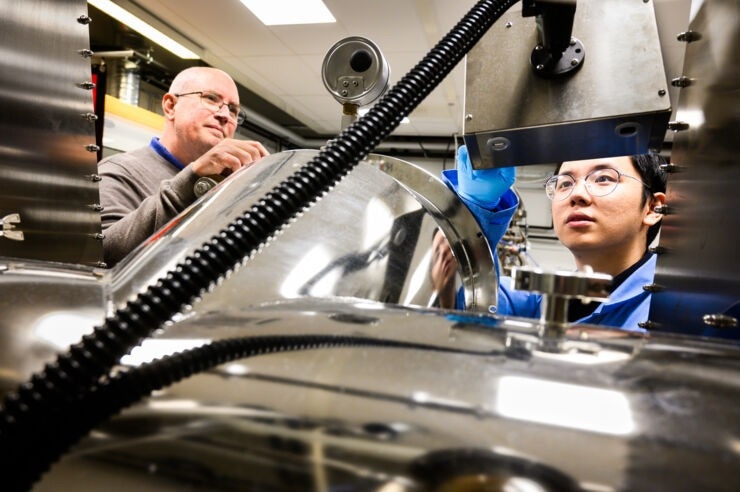Stable and eco-friendly organic solar cells can be made from lignin, one of nature's most abundant organic compounds. It has now been demonstrated by researchers at Linköping University and the Royal Institute of Technology (KTH) that organic solar cells may be further enhanced by using untreated kraft lignin. Advanced Materials, a scientific publication, has published the study.
 The long-term goal for Mats Fahlman and Qilun Zhang is to build a solar cell almost entirely made from wood materials. Image Credit: Thor Balkhed
The long-term goal for Mats Fahlman and Qilun Zhang is to build a solar cell almost entirely made from wood materials. Image Credit: Thor Balkhed
Right now, one of the primary sustainable energy sources appears to be sunlight. Conventional silicon solar cells are effective, but their production requires a lot of energy and is complex, which can result in dangerous chemical leaks.
Due to their numerous uses, including indoor usage and garment attachment for personal electronic device charging, cheap production cost, lightweight, and flexibility, organic solar cells have become a hot topic in the study.
However, one issue is that organic solar cells are comprised of plastic or oil-derived polymers. As a result, although they are organic, they are not as ecologically beneficial as they might be.
Directly from Wood Pulp
Linköping University and KTH researchers have created an organic solar cell in which part of the electron transport layer connecting to the cathode is constructed of kraft lignin, which is derived directly from wood pulp. Although lignin is now used in just a minor portion of the solar cell, the long-term objective is to create a solar cell that is nearly totally built of wood components.
We want to build efficient, reliable, cheap and environmentally friendly solar cells. This study enables us to show that this is possible and a first step towards replacing today’s oil-based materials with wood-based alternatives.
Mats Fahlman, Professor, Laboratory of Organic Electronics (LOE), Linköping University
Previous research has employed chemically modified wood-based materials to improve dependability or stability in both organic solar cells and solar cells manufactured from the crystalline material perovskite.
The Linköping researchers employed kraft lignin, a “raw” type of lignin taken straight from wood during the papermaking process, in their newly published study. In collaboration with KTH, they investigated which molecular composition of lignin is most suitable for the task.
We have created a material, or composite, from kraft lignin which is to constitute the cathode interface layer. It turned out that this made the solar cell more stable. The advantage of kraft lignin is that it has the ability to create many hydrogen bonds, which helps to stabilize the solar cell.
Qilun Zhang, Principal Research Engineer, Laboratory of Organic Electronics (LOE), Linköping University
Non-Toxic, Sustainable and Cheap
As of right now, most organic solar cells are used inside. In sensors and other low-power devices, they can also take the place of batteries. According to Mats Fahlman, this is an initial step into the market for organic solar cells. Larger uses of this technology, such as pure energy supply, can then be expanded. The whole solar cell would be more ecologically friendly if it were constructed using wood components.
Fahlman added, “Organic solar cells will never be the most efficient. But their advantage is that they are non-toxic, sustainable and cheap. If they have a 15-20 percent efficiency, that is more than enough for most applications.”
Journal Reference:
Zhang, Q., et. al. (2023) Industrial Kraft Lignin Based Binary Cathode Interface Layer Enables Enhanced Stability in High Efficiency Organic Solar Cells. Advanced Materials. doi:10.1002/adma.202307646